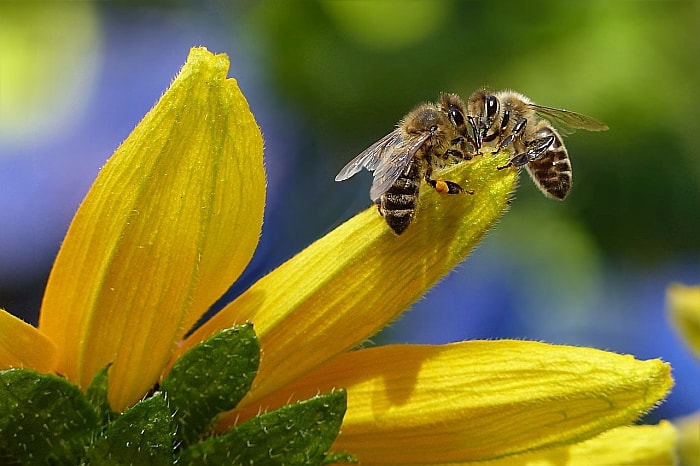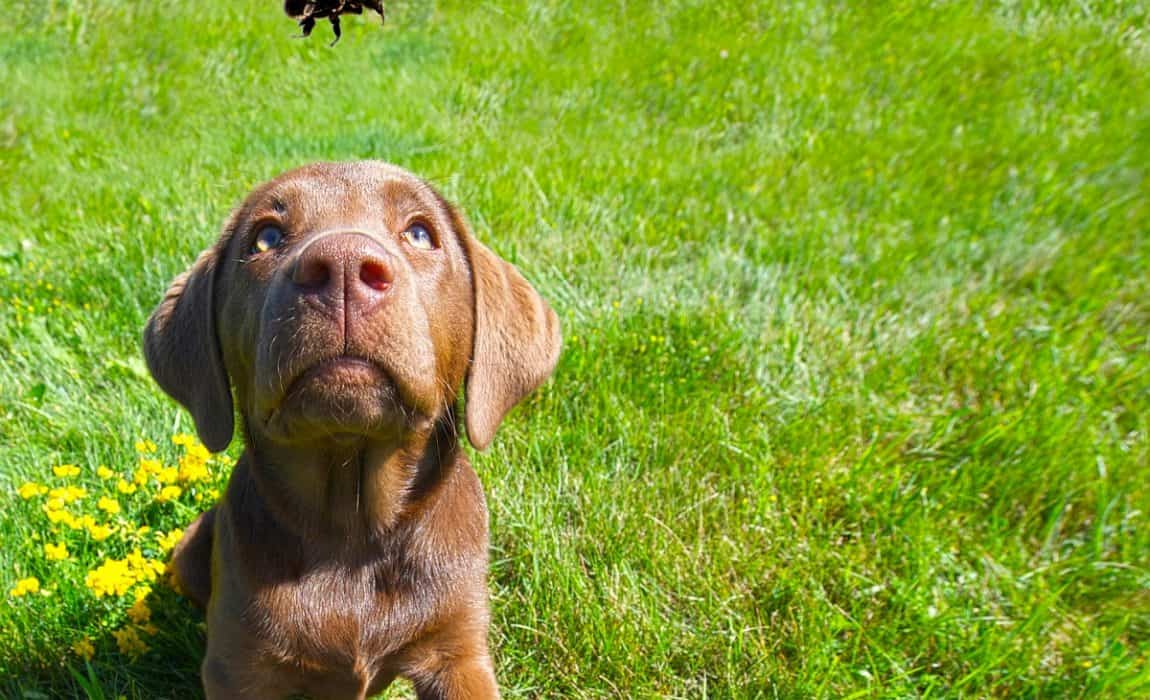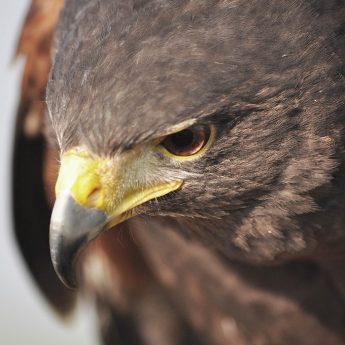Dogs have amazing reflexes, particularly when it comes to their mouths. Many can pluck a thrown treat from the air with the grace and skill of a Gold Glove shortstop.
But unfortunately for our furry friends, these reflexes occasionally get them into trouble.
Problems occur when dogs instinctually snap flying bugs from the air. This isn’t usually a big deal when said bug is a butterfly, housefly or mosquito, but dogs sometimes grab bees, wasps, hornets and yellow jackets without understanding the painful sting they are likely to suffer.
This usually results in a whimpering dog and a worried owner. But don’t panic – most bee stings are harmless, and even those stings that cause a serious reaction can often be treated successfully by your vet.
Can Dogs Become Sick from Eating Wasps or Bees?
Let’s get this out of the way first: The only danger from your dog eating a bee or wasp relates to the sting.
Nothing bad is likely to happen unless the insect injects some of its venom into your pooch’s body. Otherwise, your dog will just digest it like most other packets of protein.
This is true because bees are venomous; they are not poisonous. Forgive me for putting on my uber-pedantic hat here, but the terms poison and venom refer to two different types of toxin.
Poisons cause unpleasant effects when they are touched, inhaled or eaten. This means that poisons are administered “passively.” By contrast, venoms are injected via some type of syringe-like anatomical structure. This could be a stinger, a fang or even specialized hairs. Venoms are “actively” administered.
For example, some mushrooms, many amphibians and nightshade plants are poisonous. Touch or eat these things and you’ll regret it.
By contrast, bees, spiders, rattlesnakes and ants, among other things, are venomous. It is theoretically safe to eat or touch any of these animals without danger (note that I did say “theoretically” – touching rattlesnakes is usually a bad idea). But you sure don’t want to get bitten or stung by them.
Usually, venoms are ineffective if ingested or touched. This means that you don’t need to worry about your dog being poisoned from digesting the bee.

How to Care for Minor Bee Stings on Dogs
Most dogs will only suffer relatively mild symptoms following a bee or wasp sting. They’ll experience some localized pain and swelling, and they’ll probably make a mental note to avoid eating bees and wasps in the future.
If your dog suffers a minor sting, you’ll want to start by removing the bee’s stinger, if present (only honeybees leave behind a stinger).
Always try to “scrape” out a bee stinger, instead of “pinching” and pulling it out, which can force more venom into the wound. So, put the tweezers down. Pick up a credit card and start scraping (just be gentle!).
The video below demonstrates how to scrape out a stinger from a human arm, but the same procedure will work for your dog — although you may have to push some hair aside to access the wound.
The Purdue University College of Veterinary Medicine recommends applying baking soda and water or a cool compress to the wound to try to reduce your pup’s pain.
However, they note that while bee venom is acidic, and can therefore be neutralized with baking soda, it will potentially make a wasp sting – which contains alkali venom – worse. In such cases, some diluted apple cider vinegar may prove helpful.
How to Care for Serious Stings
Dogs who have an allergy to bee or wasp venom may require immediate medical attention. These unfortunate pups may quickly experience an anaphylactic reaction, which can make it difficult for them to breathe. Without medical attention, allergic dogs may die following a sting.
It can be difficult to determine whether your dog is suffering from nothing more than an ordinary, run-of-the-mill bee sting, or if your dog requires prompt medical care.
You’ll always need to use your best judgment, but consider any of the four symptoms detailed below as a sign that your dog needs to see a vet pronto.
- Significant swelling of the mouth or nose area. Significant swelling can cause severe pain and it may block off your dog’s airway. Your vet can administer medications that will help reduce the swelling and halt an allergic reaction, if that is what lead to the swelling.
- Your pet is having trouble breathing. Difficulty breathing is a sign of an allergic reaction, and it is also a sign that you need to pick up your dog and get to the vet ASAP. Call the vet’s office on the way and let them know you are coming.
- Your dog becomes depressed, lethargic, unusually sleepy or uncoordinated. All of these symptoms can indicate an allergic reaction and necessitate a hasty trip to the vet.
- You feel like your dog is experiencing a serious reaction. This is an admittedly vague sign, but it speaks to an important point: You know your dog better than anyone else, and you pick up subtle body language cues you may not even consciously realize. If you think something is wrong, go ahead and head to the vet. There’s no real harm in overreacting in this case.
A Couple of Crucial Caveats For Dogs and Bee Stings
While most dogs who are not allergic to bees or wasps won’t require any veterinary care after eating a bee, there are a couple of situations in which medical care is warranted, despite the lack of an allergic reaction. These include:
Dogs Who Suffer a Sting to the back of the Tongue or down the Throat.
Dogs who are stung in these areas may be in greater danger than you’d otherwise think. Bee and wasp venoms almost always cause swelling, and if this swelling occurs in your dog’s airway, he could be in serious trouble.
Unfortunately, it can be difficult to determine if your dog was stung in his throat. So, you’ll have to use your best judgement to act in your dog’s best interest.
Obviously, it is better to err on the side of caution and seek veterinary assistance if you have any doubts.
Dogs Who Suffer from Multiple Stings
While a single dose of bee venom won’t cause most dogs any great hardship, the venom contained in several may very well prove taxing.
So, you’ll want to keep a close eye on any pup that suffers more than one sting and be ready to head to the vet if any troubling signs appear.
Using Benadryl for Your Dog’s Bee Stings
Diphenhydramine – or Benadryl as those of us not wearing lab coats call it – is often used to combat the effects of bee stings and help prevent allergic reactions.
You should always consult with your veterinarian before giving her any medication, but most dogs can tolerate Benadryl well.
Usually, Benadryl is administered to dogs at a rate of 1 milligram per pound of body weight, but only your vet can determine the proper dosage for your pup. It is often wise to discuss the potential for bee stings with your vet during a normal office visit, this way you can determine how much Benadryl you should give your dog in the event of a sting.
For the record, it doesn’t matter if you use Benadryl or the generic equivalent.
It does, however, matter that you always avoid antihistamines that contain other medications, such as analgesics (NSAIDs, Acetaminophen, etc.), or decongestants. Stick to boring old diphenhydramine.
Was It a Wasp, Hornet, Yellow Jacket or Bee?
The various bees, wasps, yellow jackets and hornet flying around our homes and the parks we visit actually exhibit some substantial differences. These differences are important from a dog-owner’s point of view.
As stated before, the venoms of different species require different types of first aid and cause different levels of pain. This is obviously somewhat subjective, but at least one scientist has tried to quantify the stings of different species.
It’s also important to note that these bugs all exhibit different habits and personalities, which makes some more likely to sting your pup than others.
For example, hornets and paper wasps tend to nest and live high above the ground, so they probably aren’t responsible for many stings. Instead, most dogs are probably stung by ground nesting (and somewhat aggressive) yellow jackets, garden-visiting honeybees, and clover-pollinating bumble bees.
You’ll just have to familiarize yourself with the appearance and habits of the most commonly encountered wasps and bees to give yourself a good chance at identifying the bug in question.
***
Has your pup ever eaten a bee? Were you there when it happened, or did she just run up to you crying? We’d love to hear your experiences.
I went through this myself a few weeks ago. I often leave the patio door open while I work, and paper wasps fly in from time to time. Usually, they just crawl around on the window by my computer. But on this particular day, one fell to the ground.
I hardly noticed, but my Rottmonster was intrigued by this curious turn of (potentially edible) events, so she pounced. A few seconds later, the tiny wasp delivered a strong objection that caused the attacking predator to withdraw with a yelp.
My beloved pooch didn’t actually swallow the wasp, she just got stung on the lip and it wasn’t a big deal. Save for some lip-licking and rubbing her snoot on the carpet for a few minutes, she was fine. A little wiser, perhaps, but no worse for the wear.
Share your best dog stinging story in the comments – what happened?
If your dog has a habit of eating all kinds of questionable stuff left lying around, be sure to also check out our articles on:








24 Comments
September 1, 2022
My tiny chihuahua ate a wasp and suffered painful bites in the mouth. I immediately thought of his frozen chicken necks (which he loves) which contain antihistamine (great for stuffy noses in allergy season). It worked like a charm, especially since it was partly frozen. He was distracted, happy, the frozen meat helped prevent swelling in his throat and mouth, and the histamine took care of the reaction! Good to keep some in the freezer during wasp season. Also, a friend who is a paramedic was quick to point out that wasps do not sting, and do not have stingers: they bite! They produce venom which MAY be released when they bite…
September 2, 2022
Hey there, Maria. Sorry to hear about your pooch’s encounter with the wasp.
But I feel compelled to point out a few things:
1) Chicken necks don’t contain antihistamines. Are you thinking of glucosamine or chondroitin?
2) There are hundreds of thousands of insect species that fall under the “wasp” umbrella. Many solitary species do lack stingers, but the majority of social wasp species do have them.
3) Wasps may also bite, but the only pain they’ll inflict in that manner is from the mechanical pinching action (which would be rather mild for most small wasps).
But all that aside, we’re glad your little Chi is doing better!
June 23, 2022
I have 2 JRTs. One is 15 the other is 6. The older dog trod on a honey bee in past and learnt from that experience. The younger dog eats hates bees and I have quite a few of them in my garden. She is actually obsessed with them. She has been stung several times and just dives back in the lavender bush snapping at them. Sometimes she will be off her food and I think it is because she has eaten a bee and it has more than likely stung inside her mouth were I can’t see. I can tell she wants to eat the food but her mouth is hurting. The next day she will be okay. The stings outside I obviously remove. I watch out for any breathing problems in particular if I think she has been stung inside her mouth. I am at the end of my tether with this – and can’t understand why she has not learnt her lesson
June 23, 2022
Hey there, Jayne. That not only sounds frustrating for you, but our heart goes out to your pupper!
Check out this article we published about keeping your dog out of a garden. You may see some ideas there that’ll help!
May 19, 2020
My 1 1/2 year old lab ate a wasp and her faced swelled up; it must have stung her several times. The vet treated her with steroids and she seemed fine for the next 4 days but died of toxicity in a week. So sad; she was a sweetheart. Can be quite serious.
May 20, 2020
So sorry to hear that, Mel!
But we appreciate you sharing your story. It illustrates that bee and wasp stings certainly can be serious in some cases.
May 2, 2020
My previous pup ate a bee but showed no signs for a while. I’m pretty sure it was still alive as it went down or she was allergic. Anyways, we were sitting in the living room and suddenly she was helping and whining and sprinting into the room. She started convulsing and losing control of her bowels. It was horrifying. My father picked her up and we raced to our vet. She was there overnight and We didn’t even know if she was alive till morning. She made a full recovery but it was not a good time whatsoever.
May 4, 2020
Wow! Scary story, Amber. So glad your pooch ended up being OK.
Thanks for sharing.
June 26, 2021
Oh wow… That’s some story! I’m pretty sure my oldest lab (nearly 12) ate a bee this morning. He’s just now started acting a little odd, about 5 hours later, but I’m wondering if he didn’t eat something else that made him hallucinate. He’s standing about 6″ away from the wall, just staring at it… It’s pretty weird, actually. But I REALLY thought I saw him eat the bee. So I just don’t know. I guess I was hoping to find that eating bees will make a dog hallucinate several hours after eating…
March 8, 2020
My Labradoodle puppy (60lbs) Nigel threw up yellow bile in the am. This afternoon he threw up yellow bile again but this time I saw a bee in the bile. He has no swelling or licking. Could the bee have made him throw up? What can I do to help him. He seems perfectly normal.
March 9, 2020
Hey, Sue.
It’s certainly possible that the bee made your pooch throw up some bile.
It’s probably a good idea to give your vet a call just to be on the safe side — a sting to the throat is a bit concerning.
Let us know how it goes!
November 12, 2019
Thanks for the useful information. We are a couple in our 60’s who share our lives with a 5-year-old Chi mix named Ethel. She’s about 15 lbs and a devoted hunter. She was preceded by a 55 lb. Cattle Dog mix, so I found it amazing to watch Ethel as she zeroed in on flying insects I could hardly see. She would lay down in the kitchen doorway and wait patiently until one of the nearly invisible prey zoomed past. She knew exactly when to get up and where to station herself to intercept the morsel in flight. Tonight a wood boring bee zoomed through the open door when she and my partner returned from a short walk. I grabbed Ethel but she is dedicated and almost caught it twice before it succumbed to the fly swatter. Closest after hours vet here is 60+ miles away. Your information was helpful! bex
October 21, 2019
Hello, my 3 year old Bernese mountain dog ate a bee while I was at work today. Don’t know when or what kind of bee it was, but his face around his muzzle is swollen. Breathing is fine, he’s playful, and his throat area is normal. I gave him Benadryl as soon as I came home and noticed his face. It’s been about two hours since then and his muzzle seems to be the same size as it was originally, everything else is the same expect he’s a little sleepy. Which is mentioned as a side affect of the Benadryl. I’ve done a cold compress to try and help the swelling but am now just letting him rest. Any advice for dealing with a bee incident like this? This is my first experience with a dog eating a bee so I’m a little nervous for my pup. Thank you for any feedback! 🙂
October 22, 2019
Sounds like you’re doing everything right, Mary. It’s still a good idea to give your vet a call, just to be on the safe side, and don’t hesitate to seek immediate veterinary attention if you note any troubling symptoms (breathing difficulties, etc.).
Tell your Bernie we want him to feel better!
July 16, 2019
We have a bee problem at our house and the exterminator came this morning. We have a yellow lab and a maltipoo. We are concerned about them eating dead bees. If a dog eats a dead bee, will it get stung because it has eaten the stinger?
July 16, 2019
Hey, Lauren.
It’s probably possible for your dogs to suffer stings from dead bees, but it wouldn’t be terribly likely. They’d need to get the stinger stuck in their skin or digestive tract, and then something would have to cause the bee’s body to pump venom through the stinger.
But, it’s always better to be safe than sorry, so I’d recommend trying to clean up the dead bees ASAP. Just be careful! You don’t want to wind up getting stung yourself.
Thanks for reading!
June 7, 2019
My dog ate a Bald Faced Wasp today. A HUGE one. Like about an inch and half long. The size on one full section of your pinky finger. Any way, it got in the house and she attacks and eats ALL bugs. She does not discriminate. This one was in the window sill and my Roxy spent a good 3 minutes attacking it in the window with paw and mouth and ended up getting it to the floor where she could finish it off. She kept biting at it for another 5 mins before she finally swallowed it. We joke that it’s muey caliente! Spicy snacks! I was a little worried because it was SO big. I think it could have gotten her tongue because she was licking her lips for a bit but no other symptoms. She may have gone out and purged it… she may have had a lil tummy ache if it was to “spicy”. It did get her wrist… she’s been licking at it and she yipped when the other dog stepped on it… but she seems to be ok. She probably didn’t learn.
May 29, 2019
My pup ate a dead bee. Any advice please
May 29, 2019
Hey, Dena. Unless the dead bee ended up stinging your pup somehow, it probably won’t cause any problems. Just keep an eye on him/her, and contact your vet if he/she starts displaying any troubling symptoms (like those listed above).
April 25, 2019
My German Shepherd is my big eater!!!! He eats allll stink bugs,,,,, and chases and eats every kind of bee he can whether it be a yellow jacket or a bumble bee or a wasp. Anything I need to worry about? He knows to grab it and let go really guck like playing so as far as I can see he hasn’t had any kind of reaction like swelling or lythargy etc. should I be concerned because we live in a log house and there are plenty of bees alllll summer!
March 12, 2019
My little dog biscuit just dont seem to learn! We have honeybees and he wont stop eating them. When he eats them he acts very weird.I keep benadryl on hand now. I try my best to prevent this from happening and hope he stops doing it. I thought he would learn his lesson by now and stop doing it, but every time one flys by he eats it.
December 20, 2018
I hope he gets better
November 5, 2018
My Yellow lab 5 yrs old ate a yellow jacket. It stung him on the tonge. He kept pacing a lot and kept licking his dog lips or dog mouth not acting like himself. What do i do take him to the vet? He is not complaining making noises yet. Please help what do I do? Are dogs usually allergic to yellow jacket bites?
November 5, 2018
Hey, Ben. Sorry about your pup.
Allergic reactions aren’t especially common, but they can happen, so you definitely want to keep an eye on him.
Ultimately, you have to just make the best decision you can on behalf of your pet. You know your pooch better than anyone else, so you’ll have to decide what is normal behavior and what is not.
The licking probably isn’t an issue — that’s a common response of dogs in any kind of pain. But watch closely for signs of swelling, difficulty breathing, or itchy skin/hives — any of which could indicate an allergic reaction.
As long as he’s breathing normally, I’d just recommend calling your vet. But if you have any inkling that his throat/mouth/face are swelling, I’d jump in the car and head right over to the vet.
Best of luck — let us know how it goes!